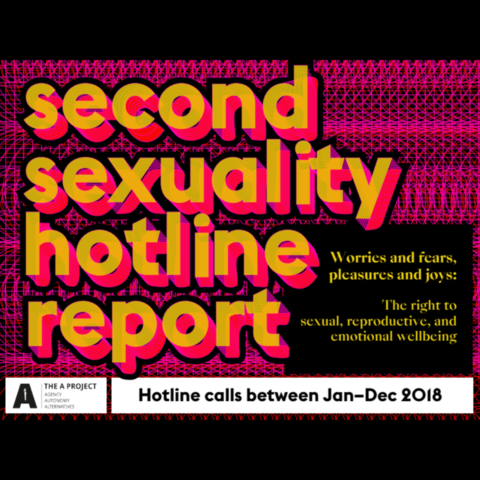The Right to Sexual, Reproductive, and Emotional Wellbeing: Second sexuality hotline report
While our first sexuality hotline report was released last year, covering the first 15 months of the hotline, this second report covers January till December of 2018. Throughout 2018, we received 314 calls (and WhatsApp/text messages and emails)—double the calls from the first report!
Across call topics, age groups, genders, and nationalities, hotline callers shared the emotional elements of what they faced while navigating their sexual and reproductive health and rights. Overall, the feelings underlying the issues discussed on the hotline largely centered around callers’ agency and autonomy over their bodies, their access to healthcare and resources, and support from friends, families, and lovers. Callers expressed feeling uncertainty about their ability to access medication or a nonjudgmental physician, and feeling scared and worried for their sexual and reproductive health.
However, they verbalized feeling relief when their health and wellbeing was ensured, comfort when myths around STIs and abortion were dispelled, and reassurance when they were able to access the resources they needed. Feelings of shame and guilt were often verbalized among callers who had desires, or made choices, conflicting with gendered social norms. In parallel, expressions of joy and fulfillment were noted among the fewer callers who described being in loving relationships and being satisfied in sex.
Excitement was voiced among those discovering their own and others’ bodies. Feeling isolated came up among those whose identities were being erased due to a lack of understanding, or who were threatened with violence and had nowhere to turn. On the other hand, callers felt validated when they were supported in their choices, and free when they were accepted in their identities. Notably, ‘positive’ and ‘negative’ emotions were not mutually exclusive at all; within the same call people would express: feeling anxious because they were not sure about how to pleasure themselves/their partners, feeling stressed about a physical condition and then relieved to hear that it is nothing to worry about, and some felt guilty because they felt oh-so-good.
To concretely and effectively relieve some of the emotional stressors that callers feel, we take the time on the hotline to unpack misconceptions, dispel myths, validate the hardships of familial and peer rejection, discuss the subjectivities of discrimination and exploitation by healthcare providers, and think of alternatives together. It is clear that access to knowledge, support, and resources, as well as the freedom from gendered norms and expectations, are key to feeling comfortable in callers’ health, relationships, bodies, identities, and choices.
Most callers, either during their call or afterwards through the anonymous online hotline evaluation form (launched mid-2018), expressed having had a “good” or “very good” overall experience on the hotline—admittedly, there may be a reporting bias of satisfied callers. The hotline counselors themselves reported positive experiences on the hotline, but they also expressed distress, frustration, anger, or sadness after calls in which callers face dire situations and have limited options. Considering the emotional difficulties expressed on the hotline, it is necessary that we align mental and emotional wellbeing with sex, sexuality, intimacy, and reproduction, within our intrapersonal, interpersonal, community dynamics, and our advocacy and organizing, as part of our efforts to center self-determination, pleasure, safety, and wellness in our movements.
To read the full report, find it here
